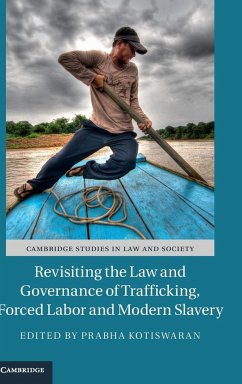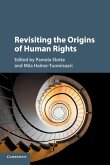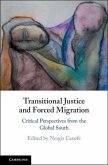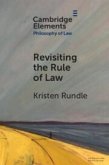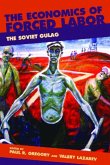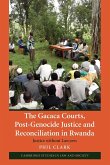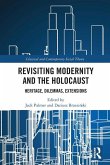Revisiting the Law and Governance of Trafficking, Forced Labor and Modern Slavery
Herausgeber: Kotiswaran, Prabha
Revisiting the Law and Governance of Trafficking, Forced Labor and Modern Slavery
Herausgeber: Kotiswaran, Prabha
- Gebundenes Buch
- Merkliste
- Auf die Merkliste
- Bewerten Bewerten
- Teilen
- Produkt teilen
- Produkterinnerung
- Produkterinnerung
Set apart from related literature, this collection anchors trafficking debates in transnational legal theory. Whilst addressing the tensions in the implementation of the Palermo protocols, it exemplifies a labor approach to trafficking and elaborates on what this paradigm shift means in comparison to a human rights or criminal justice approach.
Andere Kunden interessierten sich auch für
![Revisiting the Origins of Human Rights Revisiting the Origins of Human Rights]() Revisiting the Origins of Human Rights47,99 €
Revisiting the Origins of Human Rights47,99 €![Transitional Justice and Forced Migration Transitional Justice and Forced Migration]() Transitional Justice and Forced Migration32,99 €
Transitional Justice and Forced Migration32,99 €![Revisiting the Rule of Law Revisiting the Rule of Law]() Kristen Rundle (University of Melbourne)Revisiting the Rule of Law29,99 €
Kristen Rundle (University of Melbourne)Revisiting the Rule of Law29,99 €![Forced Migration in the Spanish Pacific World Forced Migration in the Spanish Pacific World]() Eva Maria Mehl (Wilmington University of North Carolina)Forced Migration in the Spanish Pacific World31,99 €
Eva Maria Mehl (Wilmington University of North Carolina)Forced Migration in the Spanish Pacific World31,99 €![The Economics of Forced Labor The Economics of Forced Labor]() Paul R. GregoryThe Economics of Forced Labor12,99 €
Paul R. GregoryThe Economics of Forced Labor12,99 €![The Gacaca Courts, Post-Genocide Justice and Reconciliation in Rwanda The Gacaca Courts, Post-Genocide Justice and Reconciliation in Rwanda]() Phil Clark (University of Oxford Dr)The Gacaca Courts, Post-Genocide Justice and Reconciliation in Rwanda47,99 €
Phil Clark (University of Oxford Dr)The Gacaca Courts, Post-Genocide Justice and Reconciliation in Rwanda47,99 €![Revisiting Modernity and the Holocaust Revisiting Modernity and the Holocaust]() Revisiting Modernity and the Holocaust45,99 €
Revisiting Modernity and the Holocaust45,99 €-
-
-
Set apart from related literature, this collection anchors trafficking debates in transnational legal theory. Whilst addressing the tensions in the implementation of the Palermo protocols, it exemplifies a labor approach to trafficking and elaborates on what this paradigm shift means in comparison to a human rights or criminal justice approach.
Produktdetails
- Produktdetails
- Cambridge Studies in Law and Society
- Verlag: Cambridge University Press
- Seitenzahl: 608
- Erscheinungstermin: 3. Mai 2017
- Englisch
- Abmessung: 235mm x 157mm x 37mm
- Gewicht: 1096g
- ISBN-13: 9781107160545
- ISBN-10: 1107160545
- Artikelnr.: 47720943
- Herstellerkennzeichnung
- Libri GmbH
- Europaallee 1
- 36244 Bad Hersfeld
- gpsr@libri.de
- Cambridge Studies in Law and Society
- Verlag: Cambridge University Press
- Seitenzahl: 608
- Erscheinungstermin: 3. Mai 2017
- Englisch
- Abmessung: 235mm x 157mm x 37mm
- Gewicht: 1096g
- ISBN-13: 9781107160545
- ISBN-10: 1107160545
- Artikelnr.: 47720943
- Herstellerkennzeichnung
- Libri GmbH
- Europaallee 1
- 36244 Bad Hersfeld
- gpsr@libri.de
Introduction. From sex panic to extreme exploitation: revisiting the law of
'human trafficking' Prabha Kotiswaran; Part I. Revisiting the Text and
Context of Article 3: 1. Trafficked and exploited: the urgent need for
coherence in international law Michael Dottridge; 2. The international
legal definition 'trafficking in persons': scope and application Anne
Gallagher; 3. Contemporary debt bondage, 'self-exploitation' and the limits
of the trafficking definition Janie Chuang; 4. Subjectivity of coercion:
workers' experiences with trafficking in the United States Denise Brennan;
Part II. Anti-Trafficking Law: A Legal Realist Critique: 5. The right to
locomotion? Trafficking, slavery and the state Julia O'Connell Davidson; 6.
Anti-trafficking and the new indenture Janet Halley; 7. Immigration
controls and 'modern-day slavery' Chantal Thomas; 8. Representing,
counting, valuing: managing definitional uncertainty in the law of
trafficking Kerry Rittich; Part III. Trafficking and New Forms of
Governance: 9. Counting the uncountable: constructing trafficking through
measurement Sally Engle Merry; 10. Addressing HIV/AIDS at the intersection
of anti-trafficking and health law and policy Aziza Ahmed; 11. Brokered
subjects and sexual investability Elizabeth Bernstein; Part IV. New
Directions in Anti-Trafficking Law: The Rule of the ILO: 12. Raising the
bar: the adoption of new ILO standards against forced labour Beate Andrees
and Amanda Aikman; 13. Trafficking and forced labour: filling in the gaps
with the adoption of the supplementary ILO standards, 2014 Lee Swepston;
14. Combating labour exploitation in the global economy: the need for a
differentiated approach Roger Plant; 15. Human trafficking and forced
labour: should companies be liable? Zuzanna Muskat-Gorska; Part V.
Rethinking Trafficking through Migration Policy: 16. The paradox of
'legality': temporary migrant worker programs and vulnerability to
trafficking Hila Shamir; 17. The indentured mobility of migrant domestic
workers: the case of Dubai Rhacel Salazar Parreñas and Rachel Silvey; 18.
Migrants, unfree labour, and the legal construction of domestic servitude:
migrant domestic workers in the UK Judy Fudge and Kendra Strauss.
'human trafficking' Prabha Kotiswaran; Part I. Revisiting the Text and
Context of Article 3: 1. Trafficked and exploited: the urgent need for
coherence in international law Michael Dottridge; 2. The international
legal definition 'trafficking in persons': scope and application Anne
Gallagher; 3. Contemporary debt bondage, 'self-exploitation' and the limits
of the trafficking definition Janie Chuang; 4. Subjectivity of coercion:
workers' experiences with trafficking in the United States Denise Brennan;
Part II. Anti-Trafficking Law: A Legal Realist Critique: 5. The right to
locomotion? Trafficking, slavery and the state Julia O'Connell Davidson; 6.
Anti-trafficking and the new indenture Janet Halley; 7. Immigration
controls and 'modern-day slavery' Chantal Thomas; 8. Representing,
counting, valuing: managing definitional uncertainty in the law of
trafficking Kerry Rittich; Part III. Trafficking and New Forms of
Governance: 9. Counting the uncountable: constructing trafficking through
measurement Sally Engle Merry; 10. Addressing HIV/AIDS at the intersection
of anti-trafficking and health law and policy Aziza Ahmed; 11. Brokered
subjects and sexual investability Elizabeth Bernstein; Part IV. New
Directions in Anti-Trafficking Law: The Rule of the ILO: 12. Raising the
bar: the adoption of new ILO standards against forced labour Beate Andrees
and Amanda Aikman; 13. Trafficking and forced labour: filling in the gaps
with the adoption of the supplementary ILO standards, 2014 Lee Swepston;
14. Combating labour exploitation in the global economy: the need for a
differentiated approach Roger Plant; 15. Human trafficking and forced
labour: should companies be liable? Zuzanna Muskat-Gorska; Part V.
Rethinking Trafficking through Migration Policy: 16. The paradox of
'legality': temporary migrant worker programs and vulnerability to
trafficking Hila Shamir; 17. The indentured mobility of migrant domestic
workers: the case of Dubai Rhacel Salazar Parreñas and Rachel Silvey; 18.
Migrants, unfree labour, and the legal construction of domestic servitude:
migrant domestic workers in the UK Judy Fudge and Kendra Strauss.
Introduction. From sex panic to extreme exploitation: revisiting the law of
'human trafficking' Prabha Kotiswaran; Part I. Revisiting the Text and
Context of Article 3: 1. Trafficked and exploited: the urgent need for
coherence in international law Michael Dottridge; 2. The international
legal definition 'trafficking in persons': scope and application Anne
Gallagher; 3. Contemporary debt bondage, 'self-exploitation' and the limits
of the trafficking definition Janie Chuang; 4. Subjectivity of coercion:
workers' experiences with trafficking in the United States Denise Brennan;
Part II. Anti-Trafficking Law: A Legal Realist Critique: 5. The right to
locomotion? Trafficking, slavery and the state Julia O'Connell Davidson; 6.
Anti-trafficking and the new indenture Janet Halley; 7. Immigration
controls and 'modern-day slavery' Chantal Thomas; 8. Representing,
counting, valuing: managing definitional uncertainty in the law of
trafficking Kerry Rittich; Part III. Trafficking and New Forms of
Governance: 9. Counting the uncountable: constructing trafficking through
measurement Sally Engle Merry; 10. Addressing HIV/AIDS at the intersection
of anti-trafficking and health law and policy Aziza Ahmed; 11. Brokered
subjects and sexual investability Elizabeth Bernstein; Part IV. New
Directions in Anti-Trafficking Law: The Rule of the ILO: 12. Raising the
bar: the adoption of new ILO standards against forced labour Beate Andrees
and Amanda Aikman; 13. Trafficking and forced labour: filling in the gaps
with the adoption of the supplementary ILO standards, 2014 Lee Swepston;
14. Combating labour exploitation in the global economy: the need for a
differentiated approach Roger Plant; 15. Human trafficking and forced
labour: should companies be liable? Zuzanna Muskat-Gorska; Part V.
Rethinking Trafficking through Migration Policy: 16. The paradox of
'legality': temporary migrant worker programs and vulnerability to
trafficking Hila Shamir; 17. The indentured mobility of migrant domestic
workers: the case of Dubai Rhacel Salazar Parreñas and Rachel Silvey; 18.
Migrants, unfree labour, and the legal construction of domestic servitude:
migrant domestic workers in the UK Judy Fudge and Kendra Strauss.
'human trafficking' Prabha Kotiswaran; Part I. Revisiting the Text and
Context of Article 3: 1. Trafficked and exploited: the urgent need for
coherence in international law Michael Dottridge; 2. The international
legal definition 'trafficking in persons': scope and application Anne
Gallagher; 3. Contemporary debt bondage, 'self-exploitation' and the limits
of the trafficking definition Janie Chuang; 4. Subjectivity of coercion:
workers' experiences with trafficking in the United States Denise Brennan;
Part II. Anti-Trafficking Law: A Legal Realist Critique: 5. The right to
locomotion? Trafficking, slavery and the state Julia O'Connell Davidson; 6.
Anti-trafficking and the new indenture Janet Halley; 7. Immigration
controls and 'modern-day slavery' Chantal Thomas; 8. Representing,
counting, valuing: managing definitional uncertainty in the law of
trafficking Kerry Rittich; Part III. Trafficking and New Forms of
Governance: 9. Counting the uncountable: constructing trafficking through
measurement Sally Engle Merry; 10. Addressing HIV/AIDS at the intersection
of anti-trafficking and health law and policy Aziza Ahmed; 11. Brokered
subjects and sexual investability Elizabeth Bernstein; Part IV. New
Directions in Anti-Trafficking Law: The Rule of the ILO: 12. Raising the
bar: the adoption of new ILO standards against forced labour Beate Andrees
and Amanda Aikman; 13. Trafficking and forced labour: filling in the gaps
with the adoption of the supplementary ILO standards, 2014 Lee Swepston;
14. Combating labour exploitation in the global economy: the need for a
differentiated approach Roger Plant; 15. Human trafficking and forced
labour: should companies be liable? Zuzanna Muskat-Gorska; Part V.
Rethinking Trafficking through Migration Policy: 16. The paradox of
'legality': temporary migrant worker programs and vulnerability to
trafficking Hila Shamir; 17. The indentured mobility of migrant domestic
workers: the case of Dubai Rhacel Salazar Parreñas and Rachel Silvey; 18.
Migrants, unfree labour, and the legal construction of domestic servitude:
migrant domestic workers in the UK Judy Fudge and Kendra Strauss.

